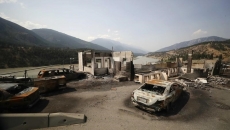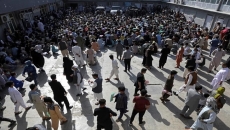Fully vaccinated U.S. citizens and permanent residents will be allowed into Canada as of Aug. 9, joined by the rest of the world Sept. 7, federal officials announced Monday as the country prepares to lower border barriers that were erected to limit the spread of COVID-19.
Officials say the 14-day quarantine requirement will be waived beginning the second week of August for eligible travellers who are currently residing in the United States and have received a full course of a COVID-19 vaccine approved for use in Canada.
The move comes two weeks after the Canada Border Services Agency began waiving quarantine rules for fully vaccinated Canadian citizens and permanent residents. It remained unclear Monday if or when the Biden administration plans to reciprocate for visitors to the U.S.
"This preliminary step allows for the government of Canada to fully operationalize the adjusted border measures ahead of Sept. 7, 2021, and recognizes the many close ties between Canadians and Americans," the government said in a news release.
Children under 12 who are accompanied by fully vaccinated and eligible family members will also be exempt from quarantine, provided they wear a mask in public places and avoid indoor group settings.
All travellers will still be required to submit a negative COVID-19 test result and proof of vaccination prior to arrival by way of the ArriveCAN smartphone app or web portal, but post-travel test results will no longer be necessary.
Canada Border Services Agency officials will also be subjecting random travellers to a mandatory molecular test upon arrival.
"This strategy allows the government of Canada to continue monitoring variants of concern in Canada and vaccine effectiveness," the release said.
"Using these layers of protection, the government of Canada can monitor the COVID-19 situation in Canada, respond quickly to threats and guide decisions on restricting international travel."
As of Aug. 9, airports in Halifax, Quebec City, Ottawa, Winnipeg and Edmonton will also be added to the list of Canadian cities where international flights are permitted to land. Air travellers will no longer be required to spend the first three nights of their quarantine at a government-approved hotel.
"However, all travellers must still provide a quarantine plan and be prepared to quarantine, in case it is determined at the border that they do not meet the necessary requirements."
Some questions and answers about the state of the Canada-U.S. border, 16 months into the COVID-19 pandemic:
Q: Who can enter Canada from the United States without having to quarantine?
A: In addition to essential workers, international students and cross-border trade shipments, all of which have been allowed from the outset, fully vaccinated Canadian citizens, permanent residents and eligible foreign nationals can now enter Canada without having to submit to a 14-day quarantine. Canada also has limited exceptions in place for foreign nationals who are immediate family members of a Canadian citizen or permanent resident, as well as a process to allow extended family members and international students to apply for entry.
Q: What are the requirements?
A: Only Canadian citizens, permanent residents and eligible foreign nationals who have gone two weeks since a full course of one of the four COVID-19 vaccines approved by Health Canada — Pfizer-BioNTech, Moderna, Oxford-AstraZeneca or Johnson & Johnson — are exempt from quarantine. Further, travellers must use either the ArriveCAN app or online portal to submit proof of vaccination, as well as the results of a negative COVID-19 test no more than three days old, prior to departure. Border officials will also want to see a paper or digital copy of vaccination documentation, and a certified translation of same if the original is not in either English or French.
Q: What's changing?
A: As of Aug. 9, fully vaccinated U.S. citizens and permanent residents will also be exempt from the quarantine requirement, subject to the same requirements and restrictions as their Canadian counterparts. Fully vaccinated travellers from elsewhere around the world will be afforded the same exemption as of Sept. 7. Children under 12 who are accompanied by fully vaccinated adults can also enter Canada without quarantining on Aug. 9, but will be required to wear a mask in public and avoid group settings, such as school and summer camp.
Also Aug. 9, international flights — currently restricted to just Montreal, Toronto, Calgary and Vancouver — will be allowed to land at five additional Canadian airports: Halifax, Quebec City, Ottawa, Winnipeg and Edmonton. The three-night mandatory hotel stay for air travellers is also being eliminated.
As well, the Canada Border Services Agency will no longer require every fully vaccinated arrival to submit to a COVID-19 test on their first day in Canada, but will maintain surveillance measures by randomly selecting travellers for testing.
Q: I've been fully vaccinated. Can I take a vacation in the United States without having to quarantine?
A: It depends on how you're travelling, and whether you are willing to quarantine in Canada upon your return. Air travellers need only submit a negative COVID-19 test no more than three days prior to departure, or proof from a health care provider that they have recovered from COVID-19 in the past 90 days. The same applies to entry by sea or by rail, with the exception of commuter trains and ferries. Entry by land is otherwise restricted, and the U.S. made it clear Monday that it is following its own timeline, and expects to extend restrictions at the Canadian and Mexican borders before they are due to expire on July 21, regardless of Canada's plan to further ease restrictions next month. Vaccinated Canadians travelling to the U.S. for less than 72 hours will also be allowed to take their pre-entry test in Canada.
Q: Can I travel to Canada from India?
No. Canada currently has a ban in place on flights from India, owing to the severity of that country's outbreak of the Delta variant of COVID-19. That ban is being extended to at least Aug. 21.
Q: I'm not fully vaccinated. What happens if I try to skirt the rules?
A: You'll either be turned away at the border or required to quarantine in Canada — or worse. Violating the Quarantine Act by falsifying vaccination records carries a maximum penalty of a $750,000 fine, six months in jail or both, not to mention the possibility of forgery charges under the Criminal Code. Violating quarantine or isolation orders can also result in a daily fine of $5,000, up to a maximum of $750,000, as well as the risk of up to six months behind bars.






